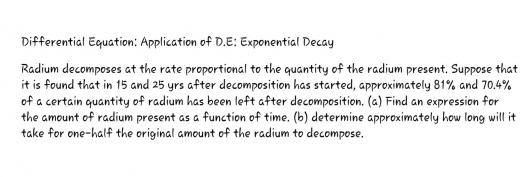Active forum topics
- Hydraulics: Rotating Vessel
- Inverse Trigo
- Application of Differential Equation: Newton's Law of Cooling
- Problems in progression
- General Solution of $y' = x \, \ln x$
- engineering economics: construct the cash flow diagram
- Eliminate the Arbitrary Constants
- Law of cosines
- Maxima and minima (trapezoidal gutter)
- Special products and factoring
New forum topics
- Hydraulics: Rotating Vessel
- Inverse Trigo
- Problems in progression
- General Solution of $y' = x \, \ln x$
- engineering economics: construct the cash flow diagram
- Integration of 4x^2/csc^3x√sinxcosx dx
- Maxima and minima (trapezoidal gutter)
- Special products and factoring
- Newton's Law of Cooling
- Find the roots of the quadratic equation by differentiation method
Recent comments
- Bakit po nagmultiply ng 3/4…4 weeks 2 days ago
- Determine the least depth…10 months 3 weeks ago
- Solve mo ang h manually…4 weeks 2 days ago
- Paano kinuha yung height na…11 months 1 week ago
- It's the unit conversion…11 months 2 weeks ago
- Refer to the figure below…11 months 2 weeks ago
- where do you get the sqrt414 weeks 2 days ago
- Thank you so much4 weeks 1 day ago
- How did you get the 2.8 mins…4 weeks 1 day ago
- How did you get the distance…4 weeks 1 day ago



Differential Equation:
Differential Equation: Application of D.E: Exponential Decay
Radium decomposes at the rate proportional to the quantity of the radium present. Suppose that it is found that in 15 and 25 yrs after decomposition has started, approximately 81% and 70.4% of a certain quantity of radium has been left after decomposition. (a) Find an expression for the amount of radium present as a function of time. (b) determine approximately how long will it take for one-half the original amount of the radium to decompose.
Let x = amount of radium at
Let x = amount of radium at any time.
$\dfrac{dx}{dt} = kt$
$\dfrac{dx}{x} = k \, dt$
$\displaystyle \int \dfrac{dx}{x} = k \int dt$
$\ln x = kt + c$
When t = 15 yrs, x = 81%
$\ln 81 = 15k + c$ ← (1)
When t = 25, x = 70.4%
$\ln 70.4 = 25k + c$ ← (2)
From (1) and (2)
$k = -0.014$
$c = 4.605$
Hence,
$\ln x = -0.014t + 4.605$ answer for part (a)
$t = \dfrac{4.605 - \ln x}{0.014}$
For x = 50%
$t = \dfrac{4.605 - \ln 50}{0.014}$
$t = 49.5 ~ \text{years}$ answer for part (b)
Another solution (By
Another solution (By Calculator - CASIO fx-991ES PLUS):
MODE 3 5
AC
$t = 50\hat{x} = 59.4 ~ \text{years}$
Note:
$\hat{x}$ = SHIFT 1 5 4